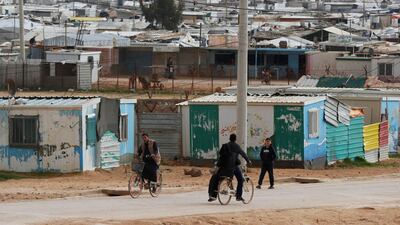Jordan announced new nationwide restrictions to curb a surge of Covid-19 cases on Monday, in what officials are calling a “decisive phase” in its fight against the virus.
The government said all restaurants, cafes, mosques and public markets would be closed for two weeks from Thursday to stem an increase in daily infections that has gone from tens to hundreds over the past five days.
The majority of classes at public and private schools will move to distance learning for the two-week period, with only Grades 1 to 3 and 12 allowed to attend in-class lessons.
Jordan recorded 214 cases and its 26th and 27th Covid-19 deaths on Monday. On Sunday, Jordan saw a daily record of 252 new coronavirus cases, with three more deaths.
Despite having reopened the airport to international flights last Tuesday, 95 per cent of the new cases have been local transmission.
Prime Minister Omar Razzaz warned the public in a televised address on Sunday that Jordan had entered a “decisive phase” against the virus.
“Your commitment will determine how we deal with the coronavirus,” he said, noting that Jordan, like most nations, was balancing health and economic concerns.
“Genuine commitment to preventative measures will continue our approach of adaptation and openness. Failure to do so will mean a setback that will unfortunately return us back to lockdowns,” Mr Razzaz said.

A new challenge for authorities is the spread of the outbreak beyond the capital Amman; five of the country’s 12 governorates are registering tens of new cases per day.
Another challenge is social customs involving large gatherings. Last week, one infected woman in the town of Southern Shouneh attended two funerals and came into contact with more than 1,000 people, resulting in dozens of new cases and a two-week lockdown in a large stretch of the Jordan Valley.
"After Jordan's initial success and reopening, people had the feeling that the coronavirus is no longer a threat or doesn't exist, so they took liberties in holding weddings, celebrations and other large gatherings," Dr Adnan Ishaq, a member of the government's coronavirus task force, told The National.
“The epidemiological situation in Jordan is still under control as the source of new infections are known. But cases are rising and people must change their behaviours again.”
Refugee camps hit
Another concern is the spread of infections to crowded refugee camps.
The UN agency for Palestinian refugees, UNRWA, recorded 74 cases over the past week, many of them in the Baqaa and Wihdat refugee camps in the Amman area.
The agency moved its health consultations via the phone, reduced capacity at its health centres by half and is continuing social distancing campaigns.
The past week saw the first confirmed cases in Syrian refugee camps: one in Zaatari, home to 77,000 refugees, and five in Azraq, where 41,000 people live in caravans in the Eastern Jordanian desert, according to UNHCR, the UN refugee agency.
The case in Zaatari was a Syrian refugee volunteer infected by Jordanian staff at a clinic, while the cases in Azraq were among refugees who work outside the camp.
"Social distancing in camps is a concern, but it is encouraging that refugees are doing what they can," UNHCR spokeswoman Lilly Carlisle told The National, noting that shops and community centres had laid down distancing markers and mask policies.
All suspected cases are quarantined in recently-built triage centres at Syrian and Palestinian refugee camps. Confirmed cases are transferred to government-regulated quarantine in the Dead Sea or to hospitals for treatment.
But refugees outside the camps remain a concern as they tend live in densely populated urban centres, Ms Carlisle said, with four such cases so far.
School uncertainty
In less than two weeks since the government reopened schools, there have been 64 confirmed coronavirus cases among students and 43 among teachers, renewing a fierce debate about the decision.
As of Monday, the Education Ministry had closed 114 schools and ordered them to conduct distance learning for a mandatory 14-day period.
"We don't know whether we should send our children to school, because the Education Ministry can't seem to make up its mind," said Dina Abdullah, a 34-year-old mother of three in Amman.
“The conditions were not right for reopening; now we have a huge coronavirus wave and our children are not getting proper education.”
Coronavirus concerns has also forced UNRWA to close 23 of its schools in refugee camps, with thousands of pupils reverting to distance learning for two weeks as per government guidelines.
UNRWA officials say they have addressed the challenges of distance learning in poverty-stricken households without internet access or smart phones by providing financial support and emergency education materials.
"We learnt a lot from last semester and this school year we are prepared for distance learning from all sides – students, teachers and parents," a UNRWA representative told The National. "This time, we were ready."













